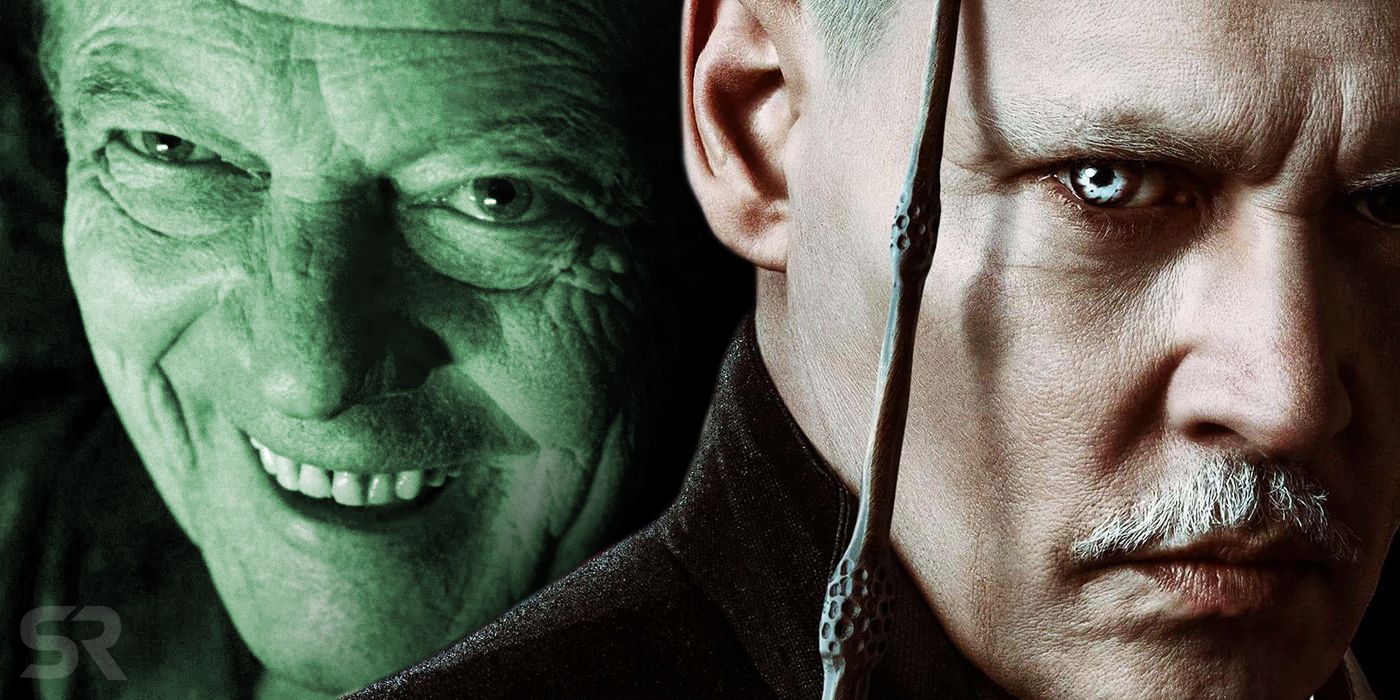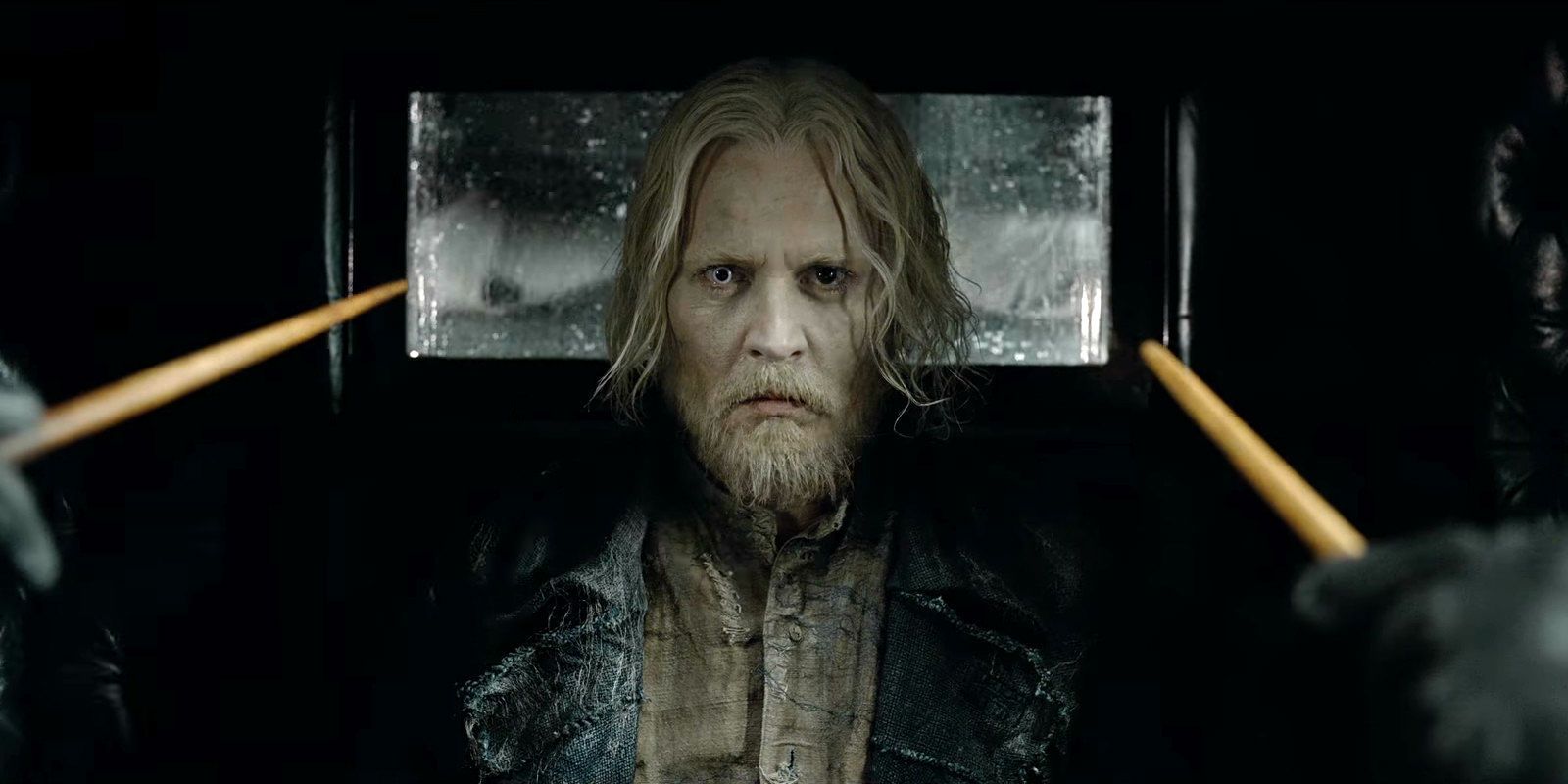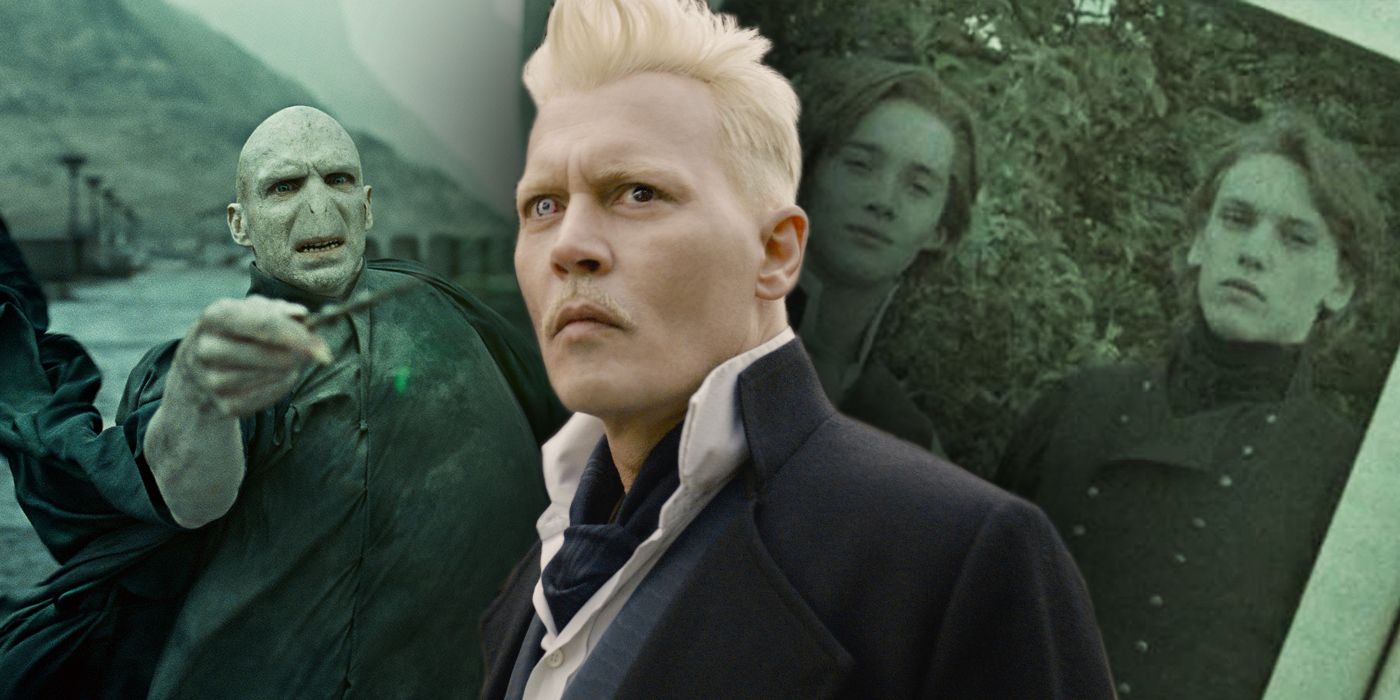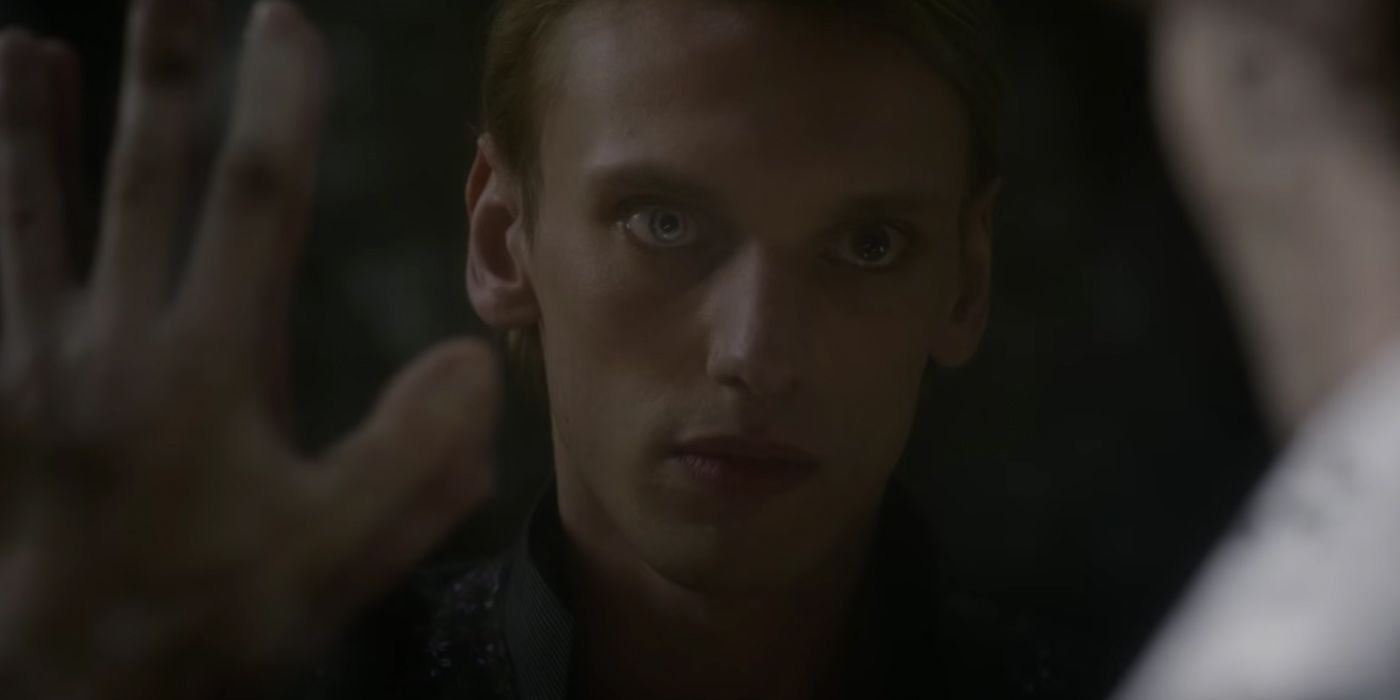https://ift.tt/2qwEfvr 
Fantastic Beasts: The Crimes of Grindelwald needs to address whether it's a prequel to the Harry Potter books or movies - and how its Gellert Grindelwald fits into both timelines. The sequel will introduce audiences to new characters and locations within the Wizarding World universe, but will also tie into the known mythology.
Set in 1927, The Crimes of Grindelwald reunites Newt Scamander (Eddie Redmayne), Tina and Queenie Goldstein (Katherine Waterston and Alison Sudol) and Jacob Kowalski (Dan Fogler) as they face the evil that is creeping into the wizarding world. They're joined by a younger version of Albus Dumbledore (Jude Law) who steers them into directly confronting the charismatic dark wizard, Gellert Grindelwald (Johnny Depp).
Related: Fantastic Beasts 2 May Retcon Harry Potter To Fix Grindelwald Plot Hole
Fans have long desired to see the machinations of these famous, formidable magicians receive their due attention, ever since Dumbledore and Grindelwald's rivalry was first revealed in Harry Potter and the Deathly Hallows. However, in depicting their power play, the Harry Potter filmmakers threaten to disrupt even the best-made plans in this multi-platform franchises.
- This Page: Harry Potter Canon Has Two Different Grindelwalds
- Page 2: The Fantastic Beasts Movies Are Struggling To Accommodate Harry Potter
- Page 3: The Different Grindelwalds Could Break Harry Potter Canon
There's A Huge Difference Between The Book And Movie Versions Of Grindelwald

The character of Gellert Grindelwald has proved to be a rather prickly problem for makers of the Fantastic Beasts series. The casting of Johnny Depp in the role has courted controversy due to his numerous lawsuits and Amber Heard's allegations of domestic abuse. Plus, moviegoers have accused the filmmakers of straight-washing Grindelwald and Dumbledore when it was revealed that the two characters – and their teenage summer romance – wouldn't be explicitly referenced in The Crimes of Grindelwald.
Yet the big bad of Fantastic Beasts exemplifies another issue that threatens the franchise: the tricky consolidation of its canon. The matter becomes clearer if we look back at Grindelwald's first film appearance in Harry Potter and the Deathly Hallows: Part 1. At this point, Lord Voldemort (Ralph Fiennes) has ultimate control of the Ministry of Magic, and is now on a quest to find the fabled Elder Wand – one of the Deathly Hallows the most powerful wand in existence – so that he can sidestep the tricky connection between his and Harry's weapons. By claiming the wand, he'll be able to eliminate Harry and vanquish any future opposition as well.
Save for a deleted scene in Harry Potter And The Sorcerer's Stone, Grindelwald hadn't really featured in the series yet. He momentarily appears as a youth (Jamie Campbell Bower) in flashbacks, before Voldemort confronts him near the end of Deathly Hallows: Part 1. At this point, Grindelwald is in his twilight years. Veteran English actor Michael Byrne gives a small yet chilling and effective performance as Dumbledore's one-time opponent; he cackles with glee when Voldemort arrives, revealing the location of the Elder Wand almost immediately. In a rare move, Voldemort spares his life and disappears.
Related: Warner Bros. Should Recast Johnny Depp's Grindelwald in Fantastic Beasts
But readers of the books will know that this scene occurs somewhat differently in the last Harry Potter novel. Book Grindelwald similarly expected Voldemort to visit him, but instead of answering the Dark Lord's questions, Grindelwald openly defies Voldemort. In fact, he taunts Voldemort about his lack of magical insight and predicts that the Elder Wand will never bend to his will. Voldemort soon kills Grindelwald in a fit of rage, only acquiring the Deathstick through his own intuition.
Most importantly of all, the cinematic Grindelwald displays no consideration for his nemesis. On the other hand, Harry and Dumbledore disclose several key details during their famous conversation at Kings Cross in the novel; Dumbledore acknowledges that Grindelwald began to regret his crimes and his conflict with the Hogwarts Headmaster during his later years. Harry even speculates that Grindelwald refused Voldemort to spare Dumbledore's grave from being disturbed.
The contrast between these two depictions of Grindelwald is most curious. It betrays that there are notable differences between the Harry Potter books and movies, thus creating a noticeable fissure in all content that is set in the Wizarding World.
Page 2 of 3: The Fantastic Beasts Movies Are Struggling To Accommodate Harry Potter

The Fantastic Beasts Movies Are Struggling To Accommodate Harry Potter
Many of the changes between the Harry Potter books and movies are a natural part of the adaptation process. Books can sustain a number of subplots, though a movie might struggle to handle the same amount without becoming unwieldy.
Related: Fantastic Beasts Is Stretching Harry Potter Continuity To Breaking Point
As such, the Harry Potter movies excise lot of backstory, something that becomes more prevalent by the time of The Deathly Hallows. The significance of the Voldemort's Horcrux host objects is downplayed massively, while Dumbledore and Tom Riddle's early days are similarly streamlined for the silver screen. But the same is true of Grindelwald. The Harry Potter movies don't even mention that he was a dark wizard who terrorized Europe; he's merely a man that Dumbledore once knew who ended up stealing the Elder Wand.
This is somewhat understandable. While J.K. Rowling might have sketched out details for further stories and character reveals in the Harry Potter universe, she might never have anticipated writing scripts for a prequel movie series. It's a similar situation with the movies. Director David Yates and writer Steve Kloves likely made these changes to Grindelwald, never expecting to revisit the character once more a decade later. But they have, and now the problems do exist.
When the Fantastic Beasts series was first announced back in 2013, a clear distinction was made between these films and the preceding Harry Potter movies. These would not be adaptations – complete with artistic license and narrative streamlining – they would originate from J.K. Rowling herself (something she's reiterated on Twitter). The Fantastic Beasts films are, therefore, canonical to the original novels. Their characters, stories and events are intrinsically linked, and they form part of the core Harry Potter oeuvre.
At first, this seems to make sense. After all, when Disney acquired Lucasfilm they transformed Star Wars into a multi-platform continuity, where the TV shows, comics, novels and films all interweave and impact each other. However, this was done by honoring and embellishing what had been previously established in the main Star Wars movies. The aforementioned differences between the Harry Potter book and movie Grindelwalds show how the canon doesn't function in the same way.
Related: Every Harry Potter Character Rumored For Fantastic Beasts 2 (So Far)
So, surely that means all of the Harry Potter movies – except for Fantastic Beasts - are explicitly non-canonical? Except they're not. The design of the Fantastic Beasts films - from the wands and the world to the filmmaking style and music - is clearly meant to connect to the Harry Potter movies. This creates many timeline issues - the events of the Harry Potter books take place in the 1990s, the films the 2000s - but nowhere is it more pressing than with the tale of two Gellert Grindelwalds.
Page 3 of 3: The Different Grindelwalds Could Break Harry Potter Canon

The Different Grindelwalds Could Break Harry Potter Canon
Some may argue that it doesn't necessarily matter which Grindelwald Fantastic Beasts is using, since they share the same name and evil personality. However, this conundrum will undoubtedly have a bearing on the series going forward.
Grindelwald's altruism – or aggressiveness – could heavily inform the ways in which the characters and plots develop in the Fantastic Beasts series. Depending on how Rowling and Yates choose to depict him, he could end up with the slim redeeming qualities of the book, or the few of the films. This becomes even more important as the saga marches on towards that climatic duel with Dumbledore in 1945. Given that Johnny Depp's iteration hews closer to the paler, thinner and creepier version of The Deathly Hallows: Part 1 than the handsome "merry-faced" trickster of the books, it would appear that the choice has been made.
The case of the contrasting Grindelwalds is not an endgame by any means. It's the kind of sticking point that's bound to come up, especially when the writer and filmmakers weren't planning on making the Fantastic Beasts movies. If Grindelwald has been retconned into a figure that's more sinister than he was first depicted as, then that's perfectly understandable (see also: Gollum's evolution from the original drafts of The Hobbit to The Lord of the Rings). Moreover, its Rowling's sandpit, so changes can naturally be made at her discretion. Despite this, the case of the differing Grindelwalds looms large in the series whose world-building, characterization and plotting that has been painstakingly crafted and meticulously maintained. The inclusion of a young Professor McGonagall further confirms – and confounds – these issues.
Read More: Fantastic Beasts: Professor McGonagall Breaks Harry Potter Canon
Additionally, if the movie Grindelwald is prized above the novel's version, what does this mean for the rest of the deviations from the Harry Potter books? Certainly, The Deathly Hallows films depict Peter Pettigrew seemingly surviving Harry and Ron's breakout of Malfoy Manor and Harry destroying the Elder Wand – events which did not occur in the novel. If more movies and books are created and they take place after The Deathly Hallows, one can only wonder how difficult these developments will be to reconcile. If there's ever a Harry Potter 8, these problems compound.
-
It remains to be seen whether the younger movie Grindelwald will show compassion towards Dumbledore as in the books, or antipathy, like his cinematic incarnation does. In the meantime, the contradictory portrayals demonstrate the unfortunate – and almost inevitable – pitfalls of shared fictional universes. Nevertheless, it will be interesting to see how J.K. Rowling and the makers of Fantastic Beasts: The Crimes of Grindelwald will acknowledge this, through the sprawling world of her books or the streamlined stories that we enjoy onscreen.
More: Fantastic Beasts 2: Every Update You Need To Know
from ScreenRant - Feed https://ift.tt/2QplnKb
via IFTTT



.jpg)
0 Yorumlar